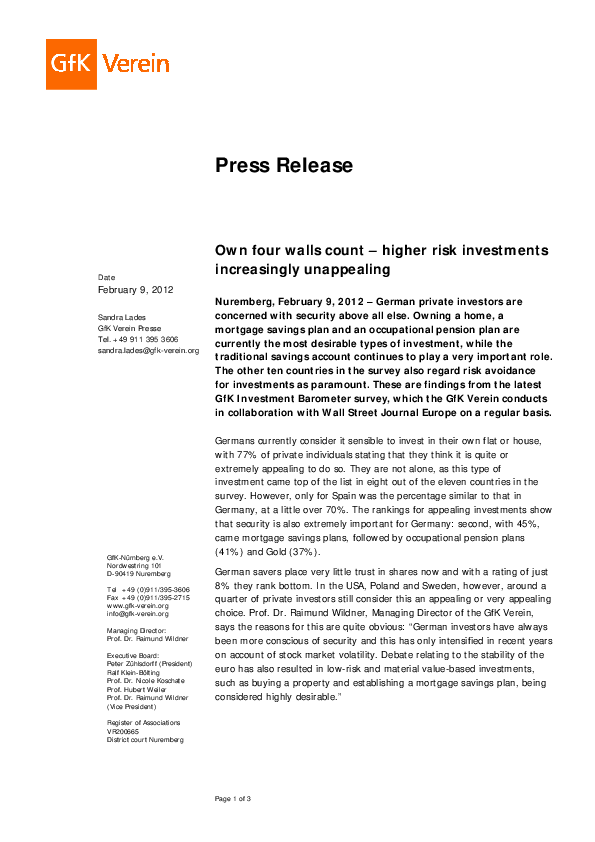Press
Own four walls count – higher risk investments increasingly unappealing
German private investors are concerned with security above all else. Owning a home, a mortgage savings plan and an occupational pension plan are currently the most desirable types of investment, while the traditional savings account continues to play a very important role. The other ten countries in the survey also regard risk avoidance for investments as paramount. These are findings from the latest GfK Investment Barometer survey, which the GfK Verein conducts in collaboration with Wall Street Journal Europe on a regular basis.
Germans currently consider it sensible to invest in their own flat or house, with 77% of private individuals stating that they think it is quite or extremely appealing to do so. They are not alone, as this type of investment came top of the list in eight out of the eleven countries in the survey. However, only for Spain was the percentage similar to that in Germany, at a little over 70%. The rankings for appealing investments show that security is also extremely important for Germany: second, with 45%, came mortgage savings plans, followed by occupational pension plans (41%) and Gold (37%).
German savers place very little trust in shares now and with a rating of just 8% they rank bottom. In the USA, Poland and Sweden, however, around a quarter of private investors still consider this an appealing or very appealing choice. Prof. Dr. Raimund Wildner, Managing Director of the GfK Verein, says the reasons for this are quite obvious: “German investors have always been more conscious of security and this has only intensified in recent years on account of stock market volatility. Debate relating to the stability of the euro has also resulted in low-risk and material value-based investments, such as buying a property and establishing a mortgage savings plan, being considered highly desirable.”
Huge difference between the reality and ideals for financial investments
However, a slightly different picture emerges when exploring how Germans have actually invested their money. Although home ownership does come top in real terms, at 45% it is relatively low when compared with other countries around the world. Only in Portugal and France is the percentage of those who invest in property lower.
The traditional savings account, which is ninth most appealing in the hypothetical ratings, actually ranks second in Germany behind home ownership. At present, 43% of respondents have invested their money in the bank. Lower risk savings options also fill the next spots in the ranking, with 31% of respondents setting up a mortgage savings plan, 28% putting their money aside at home and 25% investing in a private capital life insurance policy.
Private investors want to avoid risk in future too
The question investigating which investment options savers intend to choose more or less in the next 12 months found that Germans have become extremely cautious. Saving, regardless of how, is currently not very desirable. Respondents are most likely to invest their money in their own home, with 12% stating that they intend to spend more or significantly more in this way. However, 25% also said that they plan to sell their property or spend less on private homes. This shows that, even when it comes to their own properties, more people will be “deinvesting” rather than investing.
Gold is also no longer considered the investment product of the future, which is certainly largely attributable to the fact that the gold price has fallen so dramatically. Of those private investors who currently own gold, 20% say that they wish to sell it. However, the precious metal also seems to be regarded as a safe asset for some owners, because an identical percentage plan to buy more gold in the next 12 months. This figure drops considerably when all respondents are taken into account, including those who have not yet purchased any gold: only 4% select gold as an investment choice. Stock market products are the clear loser in the investment rankings, with 17% intending to reduce their share activities over the coming 12 months and 28% even intending to completely cease stock market activities. Fixed-income securities, investment funds and unit-linked life insurance policies are almost equally unpopular.
The survey
Since 1999, the GfK Investment Barometer survey has provided information about the investment attitude and behavior of European and American consumers. The latest survey included questions asking what investments private individuals possessed, how they rate current saving options/financial products and which types of investments they intend to make more or less use of in the coming 12 months. In October and November 2011, surveys were carried out with 9,764 private investors over the age of 14 in France, Germany, Greece, Italy, the Netherlands, Poland, Portugal, Spain, Sweden, the United Kingdom and the USA.
The GfK Verein
The GfK Verein was established in 1934 as a non-profit organization for the promotion of market research. Its membership consists of approximately 600 companies and individuals. The purpose of the Verein is to develop innovative research methods in close cooperation with academic institutions, to promote the training and further education of market researchers, to observe the structures and developments in society, the economy and politics that play a key role in private consumption, and to research their effects on consumers. Survey results are made available to the membership free of charge. The GfK Verein is a shareholder in GfK SE.
Responsible under press legislation:
GfK Verein, Press Office
Sandra Lades
Nordwestring 101
90419 Nuremberg
+49 911 95151989
sandra.lades@nim.org
